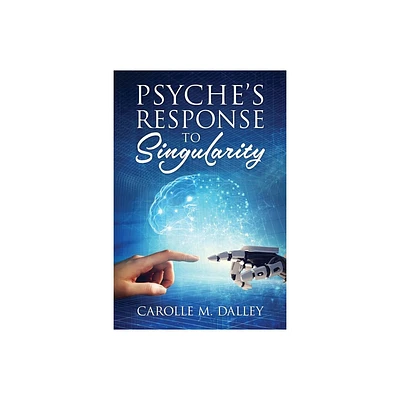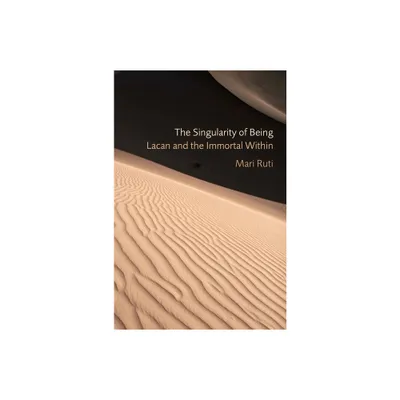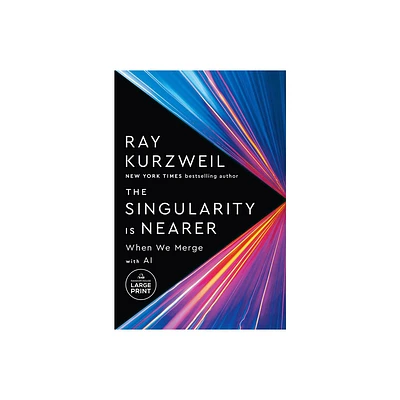Home
Psyche's Response to Singularity
Loading Inventory...
Barnes and Noble
Psyche's Response to Singularity
Current price: $27.95


Barnes and Noble
Psyche's Response to Singularity
Current price: $27.95
Loading Inventory...
Size: Hardcover
*Product Information may vary - to confirm product availability, pricing, and additional information please contact Barnes and Noble
Proponents of Technological Singularity claim that Artificial Intelligence will surpass human intelligence by the year 2045, when technology will enslave or exterminate humanity. Carolle M. Dalley uses psychological principles to respond to that claim. In one response to Singularity, she explains the principle of enantiodromia in relation to historic transitions. Enantiodromia describes the transition from an extreme focus of conscious attention to the emergence of a counter movement from the unconscious aspect of the psyche. The historic examples used to demonstrate enantiodromia are transitions from Roman Catholicism to Newtonian Science; from Enlightenment to Romanticism; and from Modernism to Postmodernism. In the current Digital Revolution, Singularity is the extreme focus of conscious attention. The extremity of that conscious focus is fostering a counter movement that Ms. Dalley predicts will become a Psychological Revolution. The ascendency of technology in the Digital Revolution will give way to a Psychological Revolution, when psychological capabilities become ascendant. She also proposes that Artificial Intelligence has the software tools to help Analytical Psychology acquire the scientific footing it has long sought.
In another response to Singularity, the author uses the principle of psychological projection to demonstrate that historically, the psyche and technology evolved in tandem with each other throughout the Agricultural, Scientific, Industrial and Digital Revolutions. Technology advances rapidly while Artificial Intelligence acquires many of the capabilities of human intelligence. However, the psyche is not stationary on the arc of evolution. The psyche is evolving. As the psyche evolves, it has been offloading knowledge to technology. To surpass human intelligence, technology must first catch up to humans on the arc of evolution.
By reference to Carl Jung's theory of psychological types, the author explains that people develop different types of intelligence far beyond rationality, which is the main focus of Singularity. Drawing on biographies of Albert Einstein, Coco Chanel, Julia Child and Jeff Bezos, the author demonstrates that the psyche has multiple capabilities of which rationality is just one. People tend to develop a dominant psychological type in early life, then invoke latent psychological types when faced with challenges in later life. To match human intelligence, Artificial Intelligence must acquire capabilities associated with all the psychological types.
The author challenges psychologists to prepare society for the upcoming Psychological Revolution by cultivating public awareness that psychological literacy is as important as reading, writing and arithmetic. Increasingly, humans interact with artificially intelligent systems that mimic human intelligence. Some systems play a supporting role in human activities. Other systems are built by mercenary merchants to manipulate humans. People need to be psychologically mature enough to distinguish between helpful and manipulative systems. To illustrate the point, the author describes movies which depict the interaction between humans and artificially intelligent systems. The movies are Terminator, Matrix, HER and Ex Machina.
In another response to Singularity, the author uses the principle of psychological projection to demonstrate that historically, the psyche and technology evolved in tandem with each other throughout the Agricultural, Scientific, Industrial and Digital Revolutions. Technology advances rapidly while Artificial Intelligence acquires many of the capabilities of human intelligence. However, the psyche is not stationary on the arc of evolution. The psyche is evolving. As the psyche evolves, it has been offloading knowledge to technology. To surpass human intelligence, technology must first catch up to humans on the arc of evolution.
By reference to Carl Jung's theory of psychological types, the author explains that people develop different types of intelligence far beyond rationality, which is the main focus of Singularity. Drawing on biographies of Albert Einstein, Coco Chanel, Julia Child and Jeff Bezos, the author demonstrates that the psyche has multiple capabilities of which rationality is just one. People tend to develop a dominant psychological type in early life, then invoke latent psychological types when faced with challenges in later life. To match human intelligence, Artificial Intelligence must acquire capabilities associated with all the psychological types.
The author challenges psychologists to prepare society for the upcoming Psychological Revolution by cultivating public awareness that psychological literacy is as important as reading, writing and arithmetic. Increasingly, humans interact with artificially intelligent systems that mimic human intelligence. Some systems play a supporting role in human activities. Other systems are built by mercenary merchants to manipulate humans. People need to be psychologically mature enough to distinguish between helpful and manipulative systems. To illustrate the point, the author describes movies which depict the interaction between humans and artificially intelligent systems. The movies are Terminator, Matrix, HER and Ex Machina.


















